Unit 1 Stay Healthy 汉译英 专练(含解析)冀教版 英语九年级上册
文档属性
| 名称 | Unit 1 Stay Healthy 汉译英 专练(含解析)冀教版 英语九年级上册 | 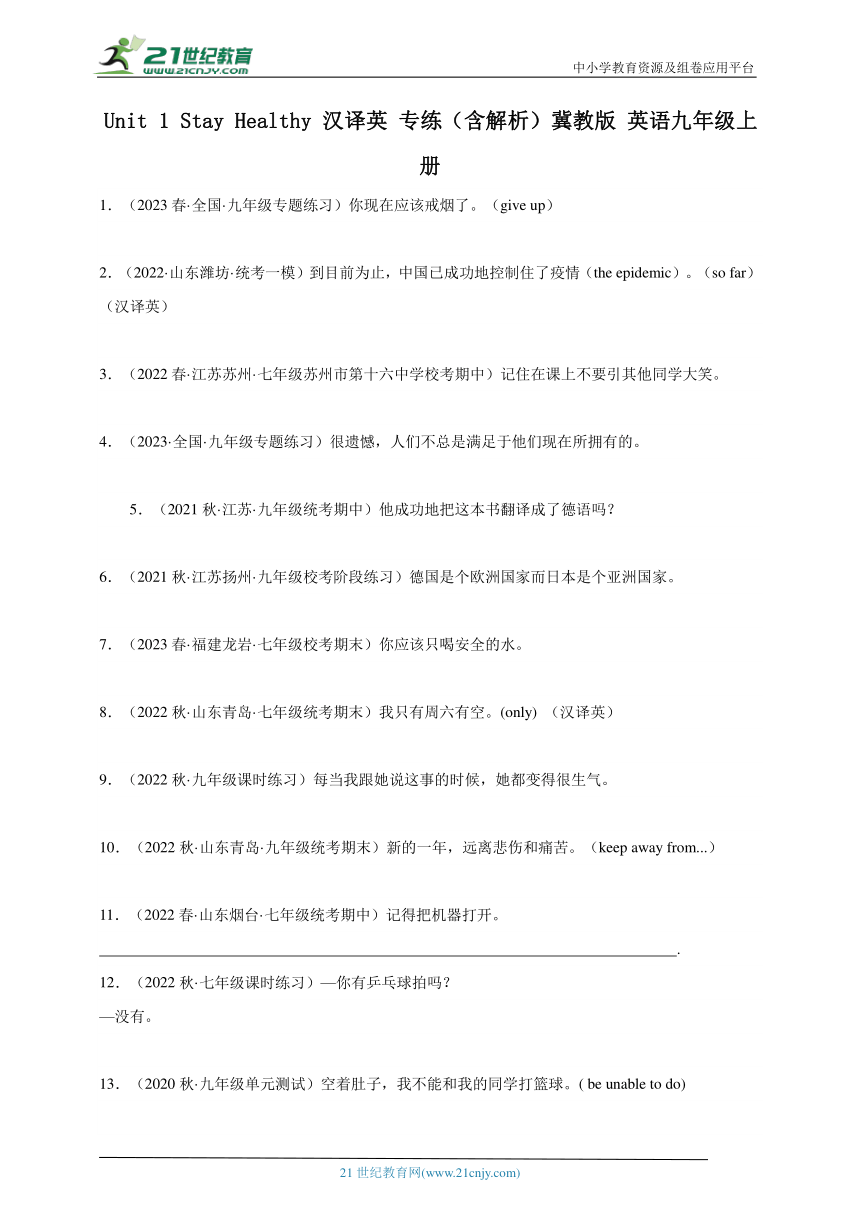 | |
| 格式 | docx | ||
| 文件大小 | 283.4KB | ||
| 资源类型 | 试卷 | ||
| 版本资源 | 冀教版 | ||
| 科目 | 英语 | ||
| 更新时间 | 2023-10-12 13:07:21 | ||
图片预览

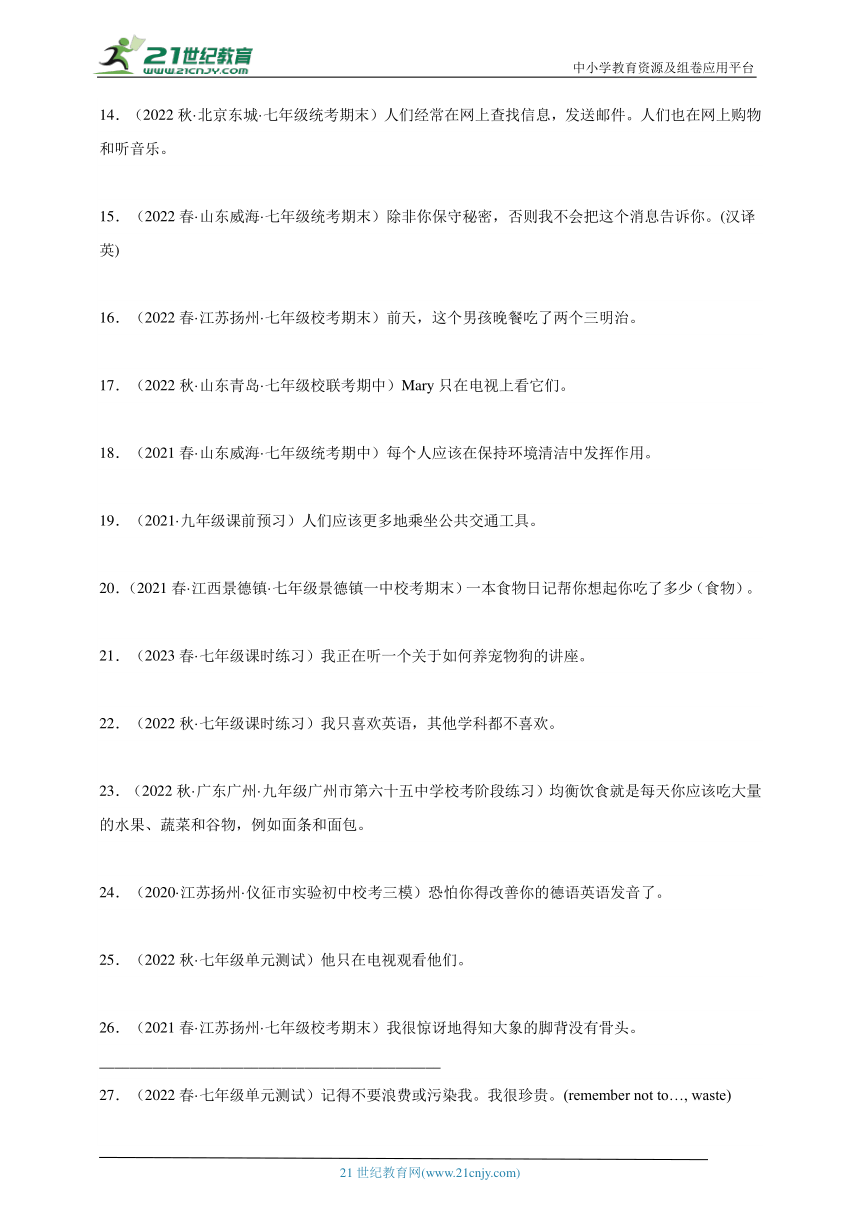
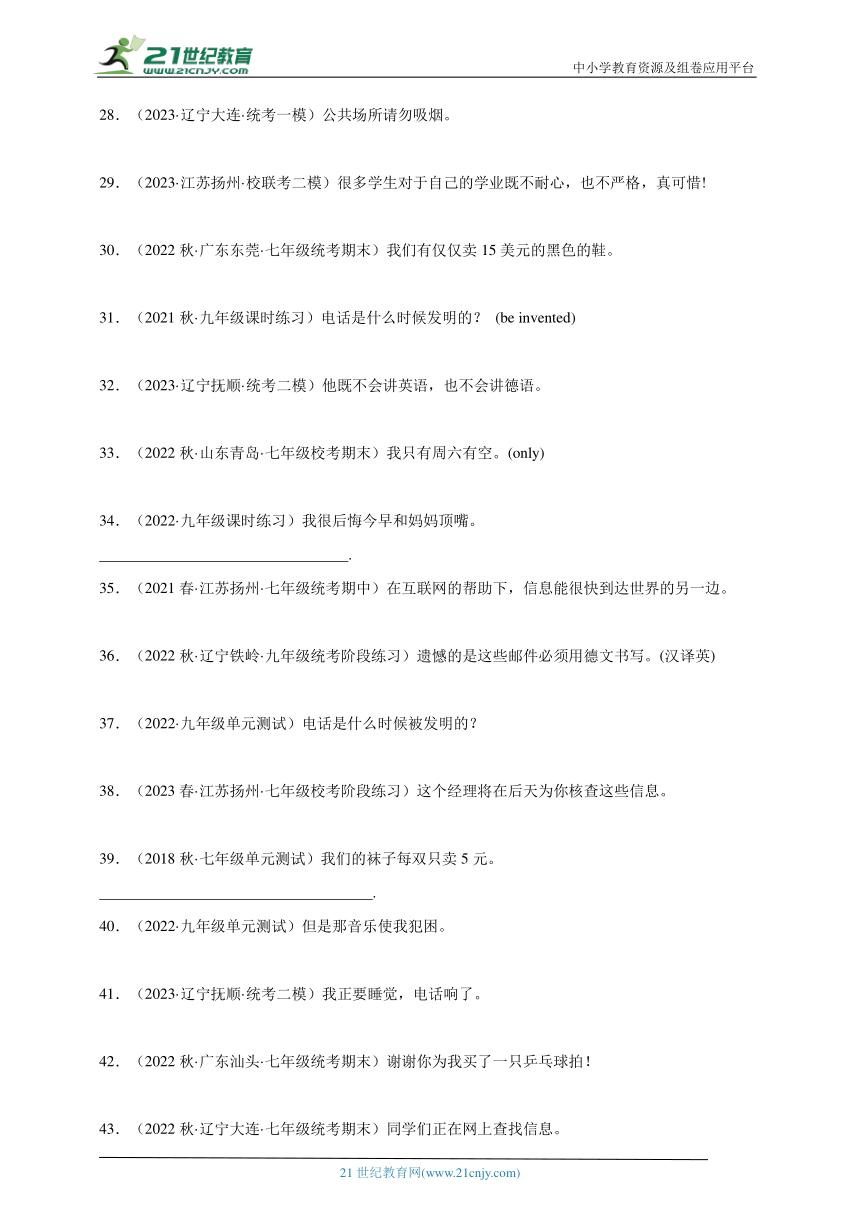
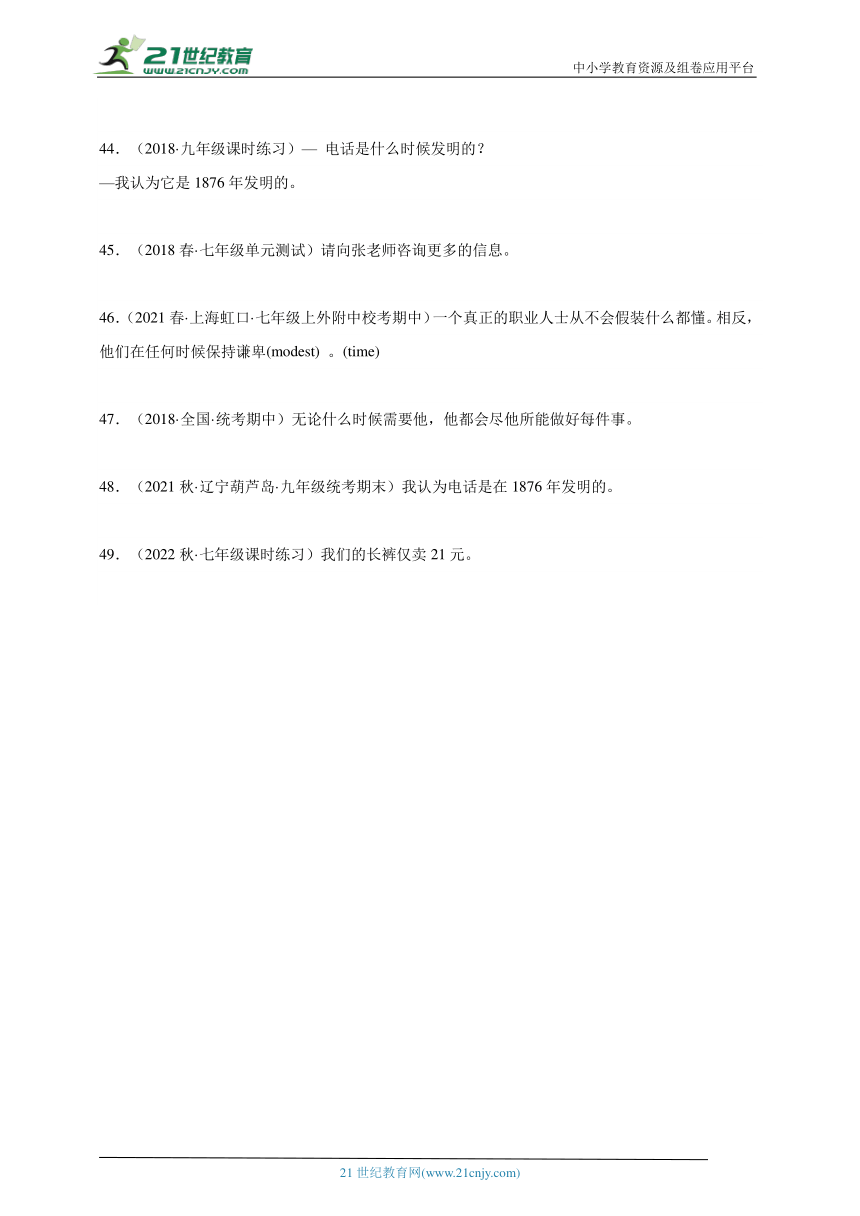
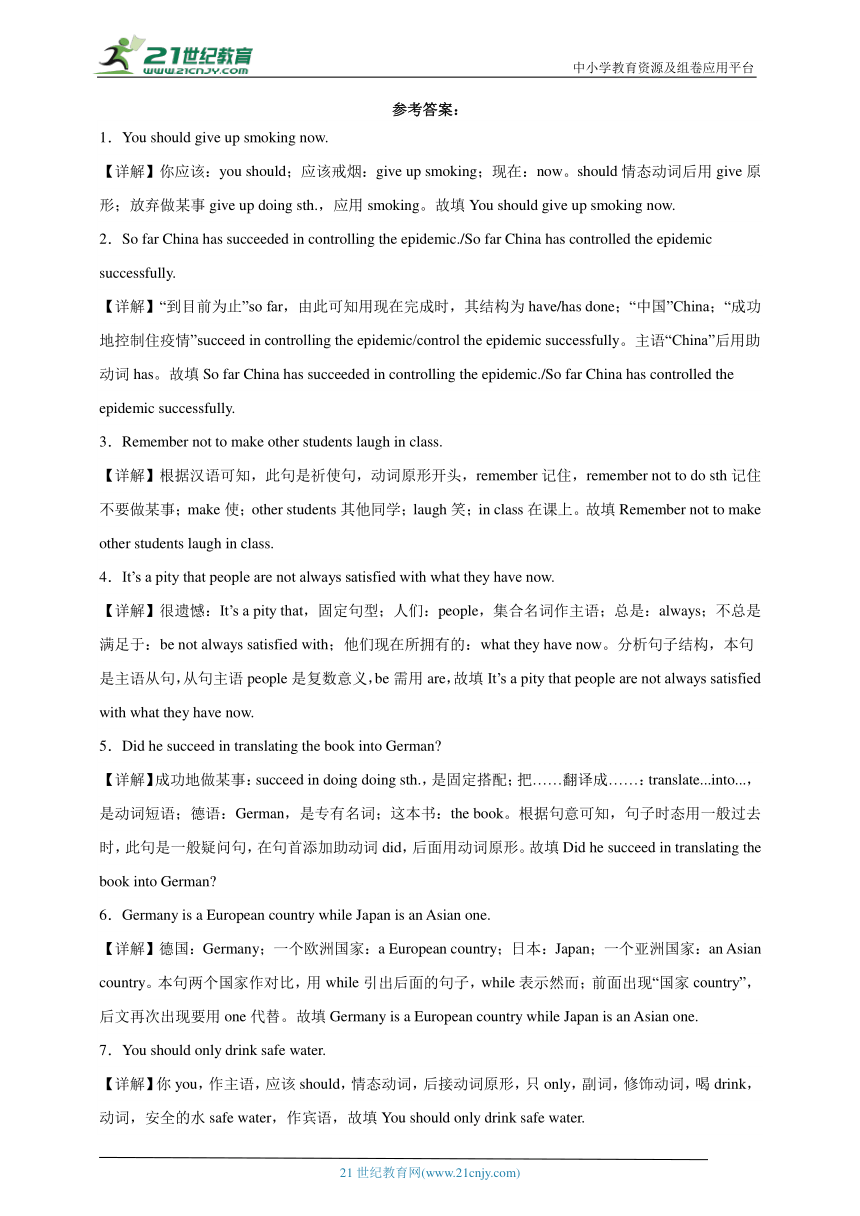
文档简介
中小学教育资源及组卷应用平台
Unit 1 Stay Healthy 汉译英 专练(含解析)冀教版 英语九年级上册
1.(2023春·全国·九年级专题练习)你现在应该戒烟了。(give up)
2.(2022·山东潍坊·统考一模)到目前为止,中国已成功地控制住了疫情(the epidemic)。(so far)(汉译英)
3.(2022春·江苏苏州·七年级苏州市第十六中学校考期中)记住在课上不要引其他同学大笑。
4.(2023·全国·九年级专题练习)很遗憾,人们不总是满足于他们现在所拥有的。
5.(2021秋·江苏·九年级统考期中)他成功地把这本书翻译成了德语吗?
6.(2021秋·江苏扬州·九年级校考阶段练习)德国是个欧洲国家而日本是个亚洲国家。
7.(2023春·福建龙岩·七年级校考期末)你应该只喝安全的水。
8.(2022秋·山东青岛·七年级统考期末)我只有周六有空。(only) (汉译英)
9.(2022秋·九年级课时练习)每当我跟她说这事的时候,她都变得很生气。
10.(2022秋·山东青岛·九年级统考期末)新的一年,远离悲伤和痛苦。(keep away from...)
11.(2022春·山东烟台·七年级统考期中)记得把机器打开。
.
12.(2022秋·七年级课时练习)—你有乒乓球拍吗?
—没有。
13.(2020秋·九年级单元测试)空着肚子,我不能和我的同学打篮球。( be unable to do)
14.(2022秋·北京东城·七年级统考期末)人们经常在网上查找信息,发送邮件。人们也在网上购物和听音乐。
15.(2022春·山东威海·七年级统考期末)除非你保守秘密,否则我不会把这个消息告诉你。(汉译英)
16.(2022春·江苏扬州·七年级校考期末)前天,这个男孩晚餐吃了两个三明治。
17.(2022秋·山东青岛·七年级校联考期中)Mary只在电视上看它们。
18.(2021春·山东威海·七年级统考期中)每个人应该在保持环境清洁中发挥作用。
19.(2021·九年级课前预习)人们应该更多地乘坐公共交通工具。
20.(2021春·江西景德镇·七年级景德镇一中校考期末)一本食物日记帮你想起你吃了多少(食物)。
21.(2023春·七年级课时练习)我正在听一个关于如何养宠物狗的讲座。
22.(2022秋·七年级课时练习)我只喜欢英语,其他学科都不喜欢。
23.(2022秋·广东广州·九年级广州市第六十五中学校考阶段练习)均衡饮食就是每天你应该吃大量的水果、蔬菜和谷物,例如面条和面包。
24.(2020·江苏扬州·仪征市实验初中校考三模)恐怕你得改善你的德语英语发音了。
25.(2022秋·七年级单元测试)他只在电视观看他们。
26.(2021春·江苏扬州·七年级校考期末)我很惊讶地得知大象的脚背没有骨头。
_____________________________________________
27.(2022春·七年级单元测试)记得不要浪费或污染我。我很珍贵。(remember not to…, waste)
28.(2023·辽宁大连·统考一模)公共场所请勿吸烟。
29.(2023·江苏扬州·校联考二模)很多学生对于自己的学业既不耐心,也不严格,真可惜!
30.(2022秋·广东东莞·七年级统考期末)我们有仅仅卖15美元的黑色的鞋。
31.(2021秋·九年级课时练习)电话是什么时候发明的? (be invented)
32.(2023·辽宁抚顺·统考二模)他既不会讲英语,也不会讲德语。
33.(2022秋·山东青岛·七年级校考期末)我只有周六有空。(only)
34.(2022·九年级课时练习)我很后悔今早和妈妈顶嘴。
.
35.(2021春·江苏扬州·七年级统考期中)在互联网的帮助下,信息能很快到达世界的另一边。
36.(2022秋·辽宁铁岭·九年级统考阶段练习)遗憾的是这些邮件必须用德文书写。(汉译英)
37.(2022·九年级单元测试)电话是什么时候被发明的?
38.(2023春·江苏扬州·七年级校考阶段练习)这个经理将在后天为你核查这些信息。
39.(2018秋·七年级单元测试)我们的袜子每双只卖5元。
.
40.(2022·九年级单元测试)但是那音乐使我犯困。
41.(2023·辽宁抚顺·统考二模)我正要睡觉,电话响了。
42.(2022秋·广东汕头·七年级统考期末)谢谢你为我买了一只乒乓球拍!
43.(2022秋·辽宁大连·七年级统考期末)同学们正在网上查找信息。
44.(2018·九年级课时练习)— 电话是什么时候发明的?
—我认为它是1876年发明的。
45.(2018春·七年级单元测试)请向张老师咨询更多的信息。
46.(2021春·上海虹口·七年级上外附中校考期中)一个真正的职业人士从不会假装什么都懂。相反,他们在任何时候保持谦卑(modest) 。(time)
47.(2018·全国·统考期中)无论什么时候需要他,他都会尽他所能做好每件事。
48.(2021秋·辽宁葫芦岛·九年级统考期末)我认为电话是在1876年发明的。
49.(2022秋·七年级课时练习)我们的长裤仅卖21元。
参考答案:
1.You should give up smoking now.
【详解】你应该:you should;应该戒烟:give up smoking;现在:now。should情态动词后用give原形;放弃做某事give up doing sth.,应用smoking。故填You should give up smoking now.
2.So far China has succeeded in controlling the epidemic./So far China has controlled the epidemic successfully.
【详解】“到目前为止”so far,由此可知用现在完成时,其结构为have/has done;“中国”China;“成功地控制住疫情”succeed in controlling the epidemic/control the epidemic successfully。主语“China”后用助动词has。故填So far China has succeeded in controlling the epidemic./So far China has controlled the epidemic successfully.
3.Remember not to make other students laugh in class.
【详解】根据汉语可知,此句是祈使句,动词原形开头,remember记住,remember not to do sth记住不要做某事;make使;other students其他同学;laugh笑;in class在课上。故填Remember not to make other students laugh in class.
4.It’s a pity that people are not always satisfied with what they have now.
【详解】很遗憾:It’s a pity that,固定句型;人们:people,集合名词作主语;总是:always;不总是满足于:be not always satisfied with;他们现在所拥有的:what they have now。分析句子结构,本句是主语从句,从句主语people是复数意义,be需用are,故填It’s a pity that people are not always satisfied with what they have now.
5.Did he succeed in translating the book into German
【详解】成功地做某事:succeed in doing doing sth.,是固定搭配;把……翻译成……:translate...into...,是动词短语;德语:German,是专有名词;这本书:the book。根据句意可知,句子时态用一般过去时,此句是一般疑问句,在句首添加助动词did,后面用动词原形。故填Did he succeed in translating the book into German
6.Germany is a European country while Japan is an Asian one.
【详解】德国:Germany;一个欧洲国家:a European country;日本:Japan;一个亚洲国家:an Asian country。本句两个国家作对比,用while引出后面的句子,while表示然而;前面出现“国家country”,后文再次出现要用one代替。故填Germany is a European country while Japan is an Asian one.
7.You should only drink safe water.
【详解】你you,作主语,应该should,情态动词,后接动词原形,只only,副词,修饰动词,喝drink,动词,安全的水safe water,作宾语,故填You should only drink safe water.
8.I’m only free on Saturday.
【详解】I“我”,作主语;be free“有空”,本句时态为一般现在时,主语是I,因此be用am;only“只有”,放于be动词后;on Saturday“在周六”,作状语,位于句末。故填I’m only free on Saturday.
9.Whenever I told her about this, she got angry.
【详解】每当……的时候“whenever”;我跟她说这事“I tell her about this”;她“she”;变得很生气“get angry”。结合语境应用一般过去时,所以动词tell变成过去式told,get变成过去式got。故填Whenever I told her about this, she got angry.
10.Keep away from sadness and pain in the new year.
【详解】句子是祈使句,以动词原形开头,远离:kee away from;悲伤和痛苦:sadness and pain;在新的一年:in the new year。故填Keep away from sadness and pain in the new year.
11.Remember to turn on the machine
【详解】记得:remember to;把……打开:turn on;机器:machine。结合语境可知,此题为祈使句,动词原形开头。机器前要加the表特指。故填Remember to turn on the machine。
12.—Do you have a ping-pong bat
—No, I don’t.
【详解】have“有”;a ping-pong bat“一个乒乓球拍”,此句是一般现在时,主语you是第二人称,疑问句借助于助动词do,将其放在句首。否定回答用don’t,人称改为第一人称I,故填—Do you have a ping-pong bat —No, I don’t.
13.With an empty stomach, I was unable to play basketball with my classmates.
【详解】根据语境可知,时态为一般过去时,“肚子”stomach;“空的”empty;“空着肚子”用介宾短语With an empty stomach,作状语;be unable to do表示“不能做某事”,主语是I“我”,be动词用was;“和……打篮球”play basketball with sb;“我的同学”my classmates。故填With an empty stomach, I was unable to play basketball with my classmates.
14.People often search for information and send emails on the Internet. People also shop and listen to music online.
【详解】人们people,名词作主语;经常often,副词;在网上on the Internet;查找信息search for information;发送邮件send emails;也also;在网上online;购物和听音乐shop and listen to music;陈述事实句子应用一般现在时,故填People often search for information and send emails on the Internet. People also shop and listen to music online.
15.Unless you keep it to yourself, I won’t tell you the news.
【详解】分析句子可知,句子是条件状语从句,遵循主将从现原则。除非:unless,首字母大写;保守秘密:keep it to oneself;告诉某人某事:tell sb. sth.;消息:news,不可数名词。故填Unless you keep it to yourself, I won’t tell you the news.
16.The day before yesterday, the boy had two sandwiches for dinner./The boy had two sandwiches for dinner the day before yesterday.
【详解】由汉语可知,本句为陈述句。the day before yesterday“前天”;the boy“这个男孩”;two sandwiches“两个三明治”;have…for dinner“晚餐吃了……”。根据时间状语可知,本句用一般过去时,时间状语可以位于句首,也可以位于句尾。故填The day before yesterday, the boy had two sandwiches for dinner./The boy had two sandwiches for dinner the day before yesterday.
17.Mary only watches them on TV.
【详解】根据句意可知,本句是一般现在时。主语Mary是第三人称单数,谓语动词用其单三形式;only“只”,副词,位于实义动词之前;watch“观看”,动词,其单三形式为watches;them“它们”,代词宾格,作动词宾语;on TV“在电视上”。故填Mary only watches them on TV.
18.Everyone should play a part in keeping the environment clean.
【详解】everyone“每个人”;should“应该”,情态动词后接动词原形;play a part in doing sth“在做某事中发挥作用”;keep sth+形容词,表示“使某物……”;environment“环境”;clean“干净的”,故填Everyone should play a part in keeping the environment clean.
19.People should take public transportation more.
【详解】人们people;应该should;乘坐公共交通工具take public transportation,should后用动词原形,更多地more,修饰动词短语。故填People should take public transportation more.
20.A food diary helps you remember how much (food) you eat.
【详解】根据汉语可知,句子时态是一般现在时,“一本食物日记”a food diary,作主语,谓语动词用三单形式;“帮助某人做某事”help sb do sth;“想起”remember,后跟宾语从句;“food食物”是不可数名词,所以用how much修饰;“你吃了多少(食物)”how much (food) you eat。故填:A food diary helps you remember how much (food) you eat.
21.I’m listening a talk about how to keep pet dogs.
【详解】listen“听”,根据“正在”可知,此句是现在进行时,其结构为“am/is/are+动词现在分词”,主语I是第一人称,助动词用am;a talk about“一个关于……的讲座”;how to do sth“如何做某事”,“疑问词+动词不定式”作宾语;keep pet dogs“养宠物狗”,故填I’m listening a talk about how to keep pet dogs.
22.I like English only. I don’t like other subjects.
【详解】I作主语;like“喜欢”,句子是一般现在时,主语是第一人称,动词用原形,否定用助动词don’t;English“英语”;only“只”;other subjects“其他的学科”,故填I like English only. I don’t like other subjects.
23.A balanced diet is that you should eat plenty of fruits, vegetables and grain products, such as noodles and bread every day.
【详解】根据中文提示可知,本句为that引导的表语从句,时态使用一般现在时。a balanced diet“均衡的饮食”,在句中作主语;every day“每天”作时间状语放在句尾;should“应该”,接动词原形;plenty of“大量,许多”;fruit“水果”;vegetable“蔬菜”;grain products“谷物”;such as“比如,例如”;noodles“面条”;bread“面包”。故填A balanced diet is that you should eat plenty of fruits, vegetables and grain products, such as noodles and bread every day.
24.I’m afraid you have to improve your German pronunciation.
【详解】结合汉语,该句应用一般现在时;“恐怕”为I’m afraid,后面跟宾语从句;“不得不”为have to do sth.;“改善你的德语英语发音”为 improve your German pronunciation,故答案为I’m afraid you have to improve your German pronunciation.
25.He only watched them on TV.
【详解】“他”可翻译为he;“只、仅仅”可翻译为only;“观看”可翻译为watch;“他们”可翻译为they,此处作watch的宾语,应该用宾格them;“在电视上”可翻译为on TV。该句为陈述句,且根据语境可知,说的是过去发生的事,句子应用一般过去时,故动词watch应用过去式watched,故填He only watched them on TV.
26.I am surprised to know (that) there are no bones in the back of elephants’ feet.
【详解】对做某事感到惊讶be surprised to do sth,本句中主语是我I,所以be动词用am;得知know;脚foot,大象的脚用复数feet;在……背面in the back of;没有there be no;骨头bone。根据句意可知,本句是一个由that引导的宾语从句,主句用一般现在时,从句用一般现在时。故填I am surprised to know (that) there are no bones in the back of elephants’ feet.
27.Remember not to waste or pollute me. I’m valuable.
【详解】分析句子可知,这段语句可以写成两个句子。第一句是祈使句,第二句子是一般现在时的陈述句。记得不要:remember not to;浪费或污染:waste or pollute;我:me(宾格);我:I(作主语);珍贵:valuable(作表语)。故答案为:Remember not to waste or pollute me. I’m valuable.
28.Don’t smoke in public places. / Smoking isn’t allowed in public places. / No smoking in public places.
【详解】in public places“在公共场所”;smoke“吸烟”。分析中文翻译可知,此句可以用祈使句的否定“Don’t+动词原形+其他”或“No+动名词+其他”,即Don’t smoke in public places或No smoking in public places;也可以用动名词作主语,表达“在公共场所吸烟是不被允许的”,allow“允许”,使用一般现在时的被动语态,即Smoking isn’t allowed in public places。故填Don’t smoke in public places. / Smoking isn’t allowed in public places. / No smoking in public places.
29.It’s a pity that many students are neither patient nor strict about their study.
【详解】根据句意可知,此题可用it做形式主语的句型:it+be+n.+that+从句。很多学生:many students;对于:about;学业:study;既不……也不……:neither...nor...;耐心:patient;严格:strict;可惜:pity。pity为单数,因此主句中的be用is;many students为复数,因此从句中的be用are。故填:It’s a pity that many students are neither patient nor strict about their study.
30.We have black shoes/shoes in black for only 15 dollars/$15.
【详解】we我们,作主语;have有,作谓语,black shoes/shoes in black黑色鞋子,“for only+价格”是固定表达,15 dollars/$15“15美元”,故填We have black shoes/shoes in black for only 15 dollars/$15.
31.When was the telephone invented
【详解】be invented被发明。电话:the telephone;什么时候:when,问时间。结合语境可知,本句是when开头的特殊疑问句,发明电话是过去的事需用一般过去时的被动语态;telephone是单数名词,系词需用was,故填When was the telephone invented
32.He can speak neither English nor German.
【详解】根据中文提示可知,本句是陈述句,且应用并列连词neither...nor...“既不……也不……”连接两个名词,English“英语”,German“德语”。他:He;会讲“can speak”。故填He can speak neither English nor German.
33.I am only free on Saturday.
【详解】主语我I;有空be free;在周六on Saturday;只有only,用在be动词之后。故填I am only free on Saturday.
34.I regretted talking back to my mother this morning
【详解】主语是“I”。表达“后悔做某事”用短语“regret doing”。表达“和某人顶嘴”用短语“talk back to”。句子讲述过去的事,是一般过去时。谓语动词用过去式“regretted”,用动名词“talking”作宾语。表达“妈妈”用“my mother”。表达“今早”用“this morning”。故填I regretted talking back to my mother this morning.
35.With the help of the Internet, the information can soon reach/get to the other side of the world.
【详解】在互联网的帮助下with the help of the Internet,信息the information,能can,很快soon,到达reach/get to,世界的另一边the other side of the world。故填With the help of the Internet, the information can soon reach/get to the other side of the world.
36.It’s a pity that the emails must be written in German.
【详解】分析句子可知,句子是陈述句,时态为一般现在时,用it作形式主语,遗憾的是:It’s a pity that;这些邮件:the emails;必须:must;邮件和谓语动词之间是被动关系,因此此处用be written;用德文:in German。故填It’s a pity that the emails must be written in German.
37.When was the telephone invented
【详解】when“什么时候”,是特殊疑问词;telephone“电话”,是主语;invent“发明”。分析句子可知,主语和动词之间是被动语态,且句子是一般过去时,结构为:was done。故填When was the telephone invented
38.The manager will/is going to check the information for you the day after tomorrow.
【详解】the day after tomorrow表示“后天”,句子时态是一般将来时,will do结构或者be going to结构。manager表示“经理”;check the information表示“核查消息”;for you表示“为你”。故填The manager will/is going to check the information for you the day after tomorrow.
39.We have socks only for 5 yuan
【详解】for+钱数意为“以……价格”,做后置定语修饰socks。故答案是We have socks only for 5 yuan。
40.But that music makes me sleepy.
【详解】“但是”为but;“那音乐”为that music;“使我犯困”为make me sleepy。结合语境可知此句为一般现在时,主语“that music”是第三人称单数形式,故动词应用单三式。故填But that music makes me sleepy.
41.I was about to go to bed when the telephone rang.
【详解】be about to do...when“正要做某事的时候,突然……”,主语是I,此处是描述过去的情况,所以be动词用was;go to bed“睡觉”;telephone“电话”;ring“响”,过去式为rang。故填I was about to go to bed when the telephone rang.
42.Thanks for buying me a ping-pong bat!/Thank you for buying a ping-pong bat for me!
【详解】“为……而感谢”为Thanks/Thank you for;“给某人买某物”为buy sth. for sb.;动词buy因位于介词for之后,故应用动名词形式buying;“一只乒乓球拍”为a ping-pong bat;“我”为me,宾格代词。故填Thanks for buying me a ping-pong bat!/Thank you for buying a ping-pong bat for me!
43.The students are looking for information on the Internet.
【详解】the students同学们,on the Internet在网上,look for information查找信息。根据句意可知,时态是现在进行时,主语是复数,be动词用are。故填The students are looking for information on the Internet.
44.— When was the telephone invented — I think it was invented in 1876.
【详解】句子是以when开头的特殊疑问句。主语telephone与动词invent之间是被动的关系,根据“In 1876”判断,句子为一般过去时态的被动语态,其构成为were/was+过去分词。主语“the telephone”为名词单数形式,助动词用was,was invented被发明;答语是以I think为主句的宾语从句,从句也要用被动语态来表达。故答案为—When was the telephone invented —I think it was invented in 1876.
45.Please ask Mr. Zhang for more information.
【详解】短语ask sb. for… 表示“向某人要……”;短语more information表示“更多的信息”。故填Please ask Mr. Zhang for more information.
46.A real professional would never pretend to know everything. Instead, they would keep modest at any time.
【详解】一个真正的职业人士A real professional,从不会做某事would never do sth,假装做某事pretend to do sh,什么都懂know everything,相反instead,保持谦卑keep modest,在任何时候at any time。故填A real professional would never pretend to know everything. Instead, they would keep modest at any time.
47.He will do his best to do everything well whenever he is needed.
【详解】短语do one’s best to do sth.表示尽某人最大努力去做某事;这里是一般将来时,will+动词的原形;主语是he,这里的one’s用his;do everything well表示做一切好的事情;whenever he is needed表示无论何时他需要。根据汉语提示,故填He will do his best to do everything well whenever he is needed.
48.I think the telephone was invented in 1876.
【详解】我认为: I think,作主句;电话:the telephone,作从句主语;发明:invent;在1876年:in 1876。 根据中文提示可知,从句是一般过去时的被动语态,be动词用was;故填I think the telephone was invented in 1876.
49.We have pants for only 21 yuan.
【详解】我们:we;长裤:pants;仅:only;for+钱数意为“以……价格”。结合语境可知,此题为一般现在时,主语we为复数,谓语动词have用原形。故填We have pants for only 21 yuan.
21世纪教育网 www.21cnjy.com 精品试卷·第 2 页 (共 2 页)
21世纪教育网(www.21cnjy.com)
Unit 1 Stay Healthy 汉译英 专练(含解析)冀教版 英语九年级上册
1.(2023春·全国·九年级专题练习)你现在应该戒烟了。(give up)
2.(2022·山东潍坊·统考一模)到目前为止,中国已成功地控制住了疫情(the epidemic)。(so far)(汉译英)
3.(2022春·江苏苏州·七年级苏州市第十六中学校考期中)记住在课上不要引其他同学大笑。
4.(2023·全国·九年级专题练习)很遗憾,人们不总是满足于他们现在所拥有的。
5.(2021秋·江苏·九年级统考期中)他成功地把这本书翻译成了德语吗?
6.(2021秋·江苏扬州·九年级校考阶段练习)德国是个欧洲国家而日本是个亚洲国家。
7.(2023春·福建龙岩·七年级校考期末)你应该只喝安全的水。
8.(2022秋·山东青岛·七年级统考期末)我只有周六有空。(only) (汉译英)
9.(2022秋·九年级课时练习)每当我跟她说这事的时候,她都变得很生气。
10.(2022秋·山东青岛·九年级统考期末)新的一年,远离悲伤和痛苦。(keep away from...)
11.(2022春·山东烟台·七年级统考期中)记得把机器打开。
.
12.(2022秋·七年级课时练习)—你有乒乓球拍吗?
—没有。
13.(2020秋·九年级单元测试)空着肚子,我不能和我的同学打篮球。( be unable to do)
14.(2022秋·北京东城·七年级统考期末)人们经常在网上查找信息,发送邮件。人们也在网上购物和听音乐。
15.(2022春·山东威海·七年级统考期末)除非你保守秘密,否则我不会把这个消息告诉你。(汉译英)
16.(2022春·江苏扬州·七年级校考期末)前天,这个男孩晚餐吃了两个三明治。
17.(2022秋·山东青岛·七年级校联考期中)Mary只在电视上看它们。
18.(2021春·山东威海·七年级统考期中)每个人应该在保持环境清洁中发挥作用。
19.(2021·九年级课前预习)人们应该更多地乘坐公共交通工具。
20.(2021春·江西景德镇·七年级景德镇一中校考期末)一本食物日记帮你想起你吃了多少(食物)。
21.(2023春·七年级课时练习)我正在听一个关于如何养宠物狗的讲座。
22.(2022秋·七年级课时练习)我只喜欢英语,其他学科都不喜欢。
23.(2022秋·广东广州·九年级广州市第六十五中学校考阶段练习)均衡饮食就是每天你应该吃大量的水果、蔬菜和谷物,例如面条和面包。
24.(2020·江苏扬州·仪征市实验初中校考三模)恐怕你得改善你的德语英语发音了。
25.(2022秋·七年级单元测试)他只在电视观看他们。
26.(2021春·江苏扬州·七年级校考期末)我很惊讶地得知大象的脚背没有骨头。
_____________________________________________
27.(2022春·七年级单元测试)记得不要浪费或污染我。我很珍贵。(remember not to…, waste)
28.(2023·辽宁大连·统考一模)公共场所请勿吸烟。
29.(2023·江苏扬州·校联考二模)很多学生对于自己的学业既不耐心,也不严格,真可惜!
30.(2022秋·广东东莞·七年级统考期末)我们有仅仅卖15美元的黑色的鞋。
31.(2021秋·九年级课时练习)电话是什么时候发明的? (be invented)
32.(2023·辽宁抚顺·统考二模)他既不会讲英语,也不会讲德语。
33.(2022秋·山东青岛·七年级校考期末)我只有周六有空。(only)
34.(2022·九年级课时练习)我很后悔今早和妈妈顶嘴。
.
35.(2021春·江苏扬州·七年级统考期中)在互联网的帮助下,信息能很快到达世界的另一边。
36.(2022秋·辽宁铁岭·九年级统考阶段练习)遗憾的是这些邮件必须用德文书写。(汉译英)
37.(2022·九年级单元测试)电话是什么时候被发明的?
38.(2023春·江苏扬州·七年级校考阶段练习)这个经理将在后天为你核查这些信息。
39.(2018秋·七年级单元测试)我们的袜子每双只卖5元。
.
40.(2022·九年级单元测试)但是那音乐使我犯困。
41.(2023·辽宁抚顺·统考二模)我正要睡觉,电话响了。
42.(2022秋·广东汕头·七年级统考期末)谢谢你为我买了一只乒乓球拍!
43.(2022秋·辽宁大连·七年级统考期末)同学们正在网上查找信息。
44.(2018·九年级课时练习)— 电话是什么时候发明的?
—我认为它是1876年发明的。
45.(2018春·七年级单元测试)请向张老师咨询更多的信息。
46.(2021春·上海虹口·七年级上外附中校考期中)一个真正的职业人士从不会假装什么都懂。相反,他们在任何时候保持谦卑(modest) 。(time)
47.(2018·全国·统考期中)无论什么时候需要他,他都会尽他所能做好每件事。
48.(2021秋·辽宁葫芦岛·九年级统考期末)我认为电话是在1876年发明的。
49.(2022秋·七年级课时练习)我们的长裤仅卖21元。
参考答案:
1.You should give up smoking now.
【详解】你应该:you should;应该戒烟:give up smoking;现在:now。should情态动词后用give原形;放弃做某事give up doing sth.,应用smoking。故填You should give up smoking now.
2.So far China has succeeded in controlling the epidemic./So far China has controlled the epidemic successfully.
【详解】“到目前为止”so far,由此可知用现在完成时,其结构为have/has done;“中国”China;“成功地控制住疫情”succeed in controlling the epidemic/control the epidemic successfully。主语“China”后用助动词has。故填So far China has succeeded in controlling the epidemic./So far China has controlled the epidemic successfully.
3.Remember not to make other students laugh in class.
【详解】根据汉语可知,此句是祈使句,动词原形开头,remember记住,remember not to do sth记住不要做某事;make使;other students其他同学;laugh笑;in class在课上。故填Remember not to make other students laugh in class.
4.It’s a pity that people are not always satisfied with what they have now.
【详解】很遗憾:It’s a pity that,固定句型;人们:people,集合名词作主语;总是:always;不总是满足于:be not always satisfied with;他们现在所拥有的:what they have now。分析句子结构,本句是主语从句,从句主语people是复数意义,be需用are,故填It’s a pity that people are not always satisfied with what they have now.
5.Did he succeed in translating the book into German
【详解】成功地做某事:succeed in doing doing sth.,是固定搭配;把……翻译成……:translate...into...,是动词短语;德语:German,是专有名词;这本书:the book。根据句意可知,句子时态用一般过去时,此句是一般疑问句,在句首添加助动词did,后面用动词原形。故填Did he succeed in translating the book into German
6.Germany is a European country while Japan is an Asian one.
【详解】德国:Germany;一个欧洲国家:a European country;日本:Japan;一个亚洲国家:an Asian country。本句两个国家作对比,用while引出后面的句子,while表示然而;前面出现“国家country”,后文再次出现要用one代替。故填Germany is a European country while Japan is an Asian one.
7.You should only drink safe water.
【详解】你you,作主语,应该should,情态动词,后接动词原形,只only,副词,修饰动词,喝drink,动词,安全的水safe water,作宾语,故填You should only drink safe water.
8.I’m only free on Saturday.
【详解】I“我”,作主语;be free“有空”,本句时态为一般现在时,主语是I,因此be用am;only“只有”,放于be动词后;on Saturday“在周六”,作状语,位于句末。故填I’m only free on Saturday.
9.Whenever I told her about this, she got angry.
【详解】每当……的时候“whenever”;我跟她说这事“I tell her about this”;她“she”;变得很生气“get angry”。结合语境应用一般过去时,所以动词tell变成过去式told,get变成过去式got。故填Whenever I told her about this, she got angry.
10.Keep away from sadness and pain in the new year.
【详解】句子是祈使句,以动词原形开头,远离:kee away from;悲伤和痛苦:sadness and pain;在新的一年:in the new year。故填Keep away from sadness and pain in the new year.
11.Remember to turn on the machine
【详解】记得:remember to;把……打开:turn on;机器:machine。结合语境可知,此题为祈使句,动词原形开头。机器前要加the表特指。故填Remember to turn on the machine。
12.—Do you have a ping-pong bat
—No, I don’t.
【详解】have“有”;a ping-pong bat“一个乒乓球拍”,此句是一般现在时,主语you是第二人称,疑问句借助于助动词do,将其放在句首。否定回答用don’t,人称改为第一人称I,故填—Do you have a ping-pong bat —No, I don’t.
13.With an empty stomach, I was unable to play basketball with my classmates.
【详解】根据语境可知,时态为一般过去时,“肚子”stomach;“空的”empty;“空着肚子”用介宾短语With an empty stomach,作状语;be unable to do表示“不能做某事”,主语是I“我”,be动词用was;“和……打篮球”play basketball with sb;“我的同学”my classmates。故填With an empty stomach, I was unable to play basketball with my classmates.
14.People often search for information and send emails on the Internet. People also shop and listen to music online.
【详解】人们people,名词作主语;经常often,副词;在网上on the Internet;查找信息search for information;发送邮件send emails;也also;在网上online;购物和听音乐shop and listen to music;陈述事实句子应用一般现在时,故填People often search for information and send emails on the Internet. People also shop and listen to music online.
15.Unless you keep it to yourself, I won’t tell you the news.
【详解】分析句子可知,句子是条件状语从句,遵循主将从现原则。除非:unless,首字母大写;保守秘密:keep it to oneself;告诉某人某事:tell sb. sth.;消息:news,不可数名词。故填Unless you keep it to yourself, I won’t tell you the news.
16.The day before yesterday, the boy had two sandwiches for dinner./The boy had two sandwiches for dinner the day before yesterday.
【详解】由汉语可知,本句为陈述句。the day before yesterday“前天”;the boy“这个男孩”;two sandwiches“两个三明治”;have…for dinner“晚餐吃了……”。根据时间状语可知,本句用一般过去时,时间状语可以位于句首,也可以位于句尾。故填The day before yesterday, the boy had two sandwiches for dinner./The boy had two sandwiches for dinner the day before yesterday.
17.Mary only watches them on TV.
【详解】根据句意可知,本句是一般现在时。主语Mary是第三人称单数,谓语动词用其单三形式;only“只”,副词,位于实义动词之前;watch“观看”,动词,其单三形式为watches;them“它们”,代词宾格,作动词宾语;on TV“在电视上”。故填Mary only watches them on TV.
18.Everyone should play a part in keeping the environment clean.
【详解】everyone“每个人”;should“应该”,情态动词后接动词原形;play a part in doing sth“在做某事中发挥作用”;keep sth+形容词,表示“使某物……”;environment“环境”;clean“干净的”,故填Everyone should play a part in keeping the environment clean.
19.People should take public transportation more.
【详解】人们people;应该should;乘坐公共交通工具take public transportation,should后用动词原形,更多地more,修饰动词短语。故填People should take public transportation more.
20.A food diary helps you remember how much (food) you eat.
【详解】根据汉语可知,句子时态是一般现在时,“一本食物日记”a food diary,作主语,谓语动词用三单形式;“帮助某人做某事”help sb do sth;“想起”remember,后跟宾语从句;“food食物”是不可数名词,所以用how much修饰;“你吃了多少(食物)”how much (food) you eat。故填:A food diary helps you remember how much (food) you eat.
21.I’m listening a talk about how to keep pet dogs.
【详解】listen“听”,根据“正在”可知,此句是现在进行时,其结构为“am/is/are+动词现在分词”,主语I是第一人称,助动词用am;a talk about“一个关于……的讲座”;how to do sth“如何做某事”,“疑问词+动词不定式”作宾语;keep pet dogs“养宠物狗”,故填I’m listening a talk about how to keep pet dogs.
22.I like English only. I don’t like other subjects.
【详解】I作主语;like“喜欢”,句子是一般现在时,主语是第一人称,动词用原形,否定用助动词don’t;English“英语”;only“只”;other subjects“其他的学科”,故填I like English only. I don’t like other subjects.
23.A balanced diet is that you should eat plenty of fruits, vegetables and grain products, such as noodles and bread every day.
【详解】根据中文提示可知,本句为that引导的表语从句,时态使用一般现在时。a balanced diet“均衡的饮食”,在句中作主语;every day“每天”作时间状语放在句尾;should“应该”,接动词原形;plenty of“大量,许多”;fruit“水果”;vegetable“蔬菜”;grain products“谷物”;such as“比如,例如”;noodles“面条”;bread“面包”。故填A balanced diet is that you should eat plenty of fruits, vegetables and grain products, such as noodles and bread every day.
24.I’m afraid you have to improve your German pronunciation.
【详解】结合汉语,该句应用一般现在时;“恐怕”为I’m afraid,后面跟宾语从句;“不得不”为have to do sth.;“改善你的德语英语发音”为 improve your German pronunciation,故答案为I’m afraid you have to improve your German pronunciation.
25.He only watched them on TV.
【详解】“他”可翻译为he;“只、仅仅”可翻译为only;“观看”可翻译为watch;“他们”可翻译为they,此处作watch的宾语,应该用宾格them;“在电视上”可翻译为on TV。该句为陈述句,且根据语境可知,说的是过去发生的事,句子应用一般过去时,故动词watch应用过去式watched,故填He only watched them on TV.
26.I am surprised to know (that) there are no bones in the back of elephants’ feet.
【详解】对做某事感到惊讶be surprised to do sth,本句中主语是我I,所以be动词用am;得知know;脚foot,大象的脚用复数feet;在……背面in the back of;没有there be no;骨头bone。根据句意可知,本句是一个由that引导的宾语从句,主句用一般现在时,从句用一般现在时。故填I am surprised to know (that) there are no bones in the back of elephants’ feet.
27.Remember not to waste or pollute me. I’m valuable.
【详解】分析句子可知,这段语句可以写成两个句子。第一句是祈使句,第二句子是一般现在时的陈述句。记得不要:remember not to;浪费或污染:waste or pollute;我:me(宾格);我:I(作主语);珍贵:valuable(作表语)。故答案为:Remember not to waste or pollute me. I’m valuable.
28.Don’t smoke in public places. / Smoking isn’t allowed in public places. / No smoking in public places.
【详解】in public places“在公共场所”;smoke“吸烟”。分析中文翻译可知,此句可以用祈使句的否定“Don’t+动词原形+其他”或“No+动名词+其他”,即Don’t smoke in public places或No smoking in public places;也可以用动名词作主语,表达“在公共场所吸烟是不被允许的”,allow“允许”,使用一般现在时的被动语态,即Smoking isn’t allowed in public places。故填Don’t smoke in public places. / Smoking isn’t allowed in public places. / No smoking in public places.
29.It’s a pity that many students are neither patient nor strict about their study.
【详解】根据句意可知,此题可用it做形式主语的句型:it+be+n.+that+从句。很多学生:many students;对于:about;学业:study;既不……也不……:neither...nor...;耐心:patient;严格:strict;可惜:pity。pity为单数,因此主句中的be用is;many students为复数,因此从句中的be用are。故填:It’s a pity that many students are neither patient nor strict about their study.
30.We have black shoes/shoes in black for only 15 dollars/$15.
【详解】we我们,作主语;have有,作谓语,black shoes/shoes in black黑色鞋子,“for only+价格”是固定表达,15 dollars/$15“15美元”,故填We have black shoes/shoes in black for only 15 dollars/$15.
31.When was the telephone invented
【详解】be invented被发明。电话:the telephone;什么时候:when,问时间。结合语境可知,本句是when开头的特殊疑问句,发明电话是过去的事需用一般过去时的被动语态;telephone是单数名词,系词需用was,故填When was the telephone invented
32.He can speak neither English nor German.
【详解】根据中文提示可知,本句是陈述句,且应用并列连词neither...nor...“既不……也不……”连接两个名词,English“英语”,German“德语”。他:He;会讲“can speak”。故填He can speak neither English nor German.
33.I am only free on Saturday.
【详解】主语我I;有空be free;在周六on Saturday;只有only,用在be动词之后。故填I am only free on Saturday.
34.I regretted talking back to my mother this morning
【详解】主语是“I”。表达“后悔做某事”用短语“regret doing”。表达“和某人顶嘴”用短语“talk back to”。句子讲述过去的事,是一般过去时。谓语动词用过去式“regretted”,用动名词“talking”作宾语。表达“妈妈”用“my mother”。表达“今早”用“this morning”。故填I regretted talking back to my mother this morning.
35.With the help of the Internet, the information can soon reach/get to the other side of the world.
【详解】在互联网的帮助下with the help of the Internet,信息the information,能can,很快soon,到达reach/get to,世界的另一边the other side of the world。故填With the help of the Internet, the information can soon reach/get to the other side of the world.
36.It’s a pity that the emails must be written in German.
【详解】分析句子可知,句子是陈述句,时态为一般现在时,用it作形式主语,遗憾的是:It’s a pity that;这些邮件:the emails;必须:must;邮件和谓语动词之间是被动关系,因此此处用be written;用德文:in German。故填It’s a pity that the emails must be written in German.
37.When was the telephone invented
【详解】when“什么时候”,是特殊疑问词;telephone“电话”,是主语;invent“发明”。分析句子可知,主语和动词之间是被动语态,且句子是一般过去时,结构为:was done。故填When was the telephone invented
38.The manager will/is going to check the information for you the day after tomorrow.
【详解】the day after tomorrow表示“后天”,句子时态是一般将来时,will do结构或者be going to结构。manager表示“经理”;check the information表示“核查消息”;for you表示“为你”。故填The manager will/is going to check the information for you the day after tomorrow.
39.We have socks only for 5 yuan
【详解】for+钱数意为“以……价格”,做后置定语修饰socks。故答案是We have socks only for 5 yuan。
40.But that music makes me sleepy.
【详解】“但是”为but;“那音乐”为that music;“使我犯困”为make me sleepy。结合语境可知此句为一般现在时,主语“that music”是第三人称单数形式,故动词应用单三式。故填But that music makes me sleepy.
41.I was about to go to bed when the telephone rang.
【详解】be about to do...when“正要做某事的时候,突然……”,主语是I,此处是描述过去的情况,所以be动词用was;go to bed“睡觉”;telephone“电话”;ring“响”,过去式为rang。故填I was about to go to bed when the telephone rang.
42.Thanks for buying me a ping-pong bat!/Thank you for buying a ping-pong bat for me!
【详解】“为……而感谢”为Thanks/Thank you for;“给某人买某物”为buy sth. for sb.;动词buy因位于介词for之后,故应用动名词形式buying;“一只乒乓球拍”为a ping-pong bat;“我”为me,宾格代词。故填Thanks for buying me a ping-pong bat!/Thank you for buying a ping-pong bat for me!
43.The students are looking for information on the Internet.
【详解】the students同学们,on the Internet在网上,look for information查找信息。根据句意可知,时态是现在进行时,主语是复数,be动词用are。故填The students are looking for information on the Internet.
44.— When was the telephone invented — I think it was invented in 1876.
【详解】句子是以when开头的特殊疑问句。主语telephone与动词invent之间是被动的关系,根据“In 1876”判断,句子为一般过去时态的被动语态,其构成为were/was+过去分词。主语“the telephone”为名词单数形式,助动词用was,was invented被发明;答语是以I think为主句的宾语从句,从句也要用被动语态来表达。故答案为—When was the telephone invented —I think it was invented in 1876.
45.Please ask Mr. Zhang for more information.
【详解】短语ask sb. for… 表示“向某人要……”;短语more information表示“更多的信息”。故填Please ask Mr. Zhang for more information.
46.A real professional would never pretend to know everything. Instead, they would keep modest at any time.
【详解】一个真正的职业人士A real professional,从不会做某事would never do sth,假装做某事pretend to do sh,什么都懂know everything,相反instead,保持谦卑keep modest,在任何时候at any time。故填A real professional would never pretend to know everything. Instead, they would keep modest at any time.
47.He will do his best to do everything well whenever he is needed.
【详解】短语do one’s best to do sth.表示尽某人最大努力去做某事;这里是一般将来时,will+动词的原形;主语是he,这里的one’s用his;do everything well表示做一切好的事情;whenever he is needed表示无论何时他需要。根据汉语提示,故填He will do his best to do everything well whenever he is needed.
48.I think the telephone was invented in 1876.
【详解】我认为: I think,作主句;电话:the telephone,作从句主语;发明:invent;在1876年:in 1876。 根据中文提示可知,从句是一般过去时的被动语态,be动词用was;故填I think the telephone was invented in 1876.
49.We have pants for only 21 yuan.
【详解】我们:we;长裤:pants;仅:only;for+钱数意为“以……价格”。结合语境可知,此题为一般现在时,主语we为复数,谓语动词have用原形。故填We have pants for only 21 yuan.
21世纪教育网 www.21cnjy.com 精品试卷·第 2 页 (共 2 页)
21世纪教育网(www.21cnjy.com)
同课章节目录
- Unit 1 Stay Healthy
- Lesson 1 What's Wrong,Danny?
- Lesson 2 A Visit to the Dentist
- Lesson 3 Good Food, Good Health
- Lesson 4 Don't Smoke, Please!
- Lesson 5 Jane's Lucky Life
- Lesson 6 Stay Away from the Hospital
- Unit Review
- Unit 2 Great People
- Lesson 7 What Is the Meaning of Lift?
- Lesson 8 A Universe of Thought
- Lesson 9 China's Most Famous "Farmer"
- Lesson 10 Touch the World
- Lesson 11 To China, with Love
- Lesson 12 Guess My Hero!
- Unit Review
- Unit 3 Safety
- Lesson 13 Be Careful,Danny!
- Lesson 14 Accidents Happen
- Lesson 15 My Helmet Saved My Life!
- Lesson 16 How Safe Is Your Home?
- Lesson 17 Staying Safe in an Earthquake
- Lesson 18 Never Catch a Dinosaur
- Unit Review
- Unit 4 Stories and poems
- Lesson 19 A Story or a Poem?
- Lesson 20 Say It in Five
- Lesson 21 The Fable of the Woodcutte
- Lesson 22 The Giant(Ⅰ)
- Lesson 23 The Giant(Ⅱ)
- Lesson 24 Writing a Poem
- Unit Review
- Unit 5 Look into Science
- Lesson 25 Let's Do an Experiment!
- Lesson 26 Keep the Candle Burning
- Lesson 27 Planet Danny
- Lesson 28 The Study of Living Things
- Lesson 29 DNA—The Story of You
- Lesson 30 Science Affects Us
- Unit Review
- Unit 6 Movies and Theate
- Lesson 31 A movie or a Play
- Lesson 32 Moving Pictures
- Lesson 33 The Fisherman and the Goldfish(Ⅰ)
- Lesson 34 The Fisherman and the Goldfish(Ⅱ)
- Lesson 35 Theatres Are Fun!
- Lesson 36 Making Plays Is Fun
- Unit Review
